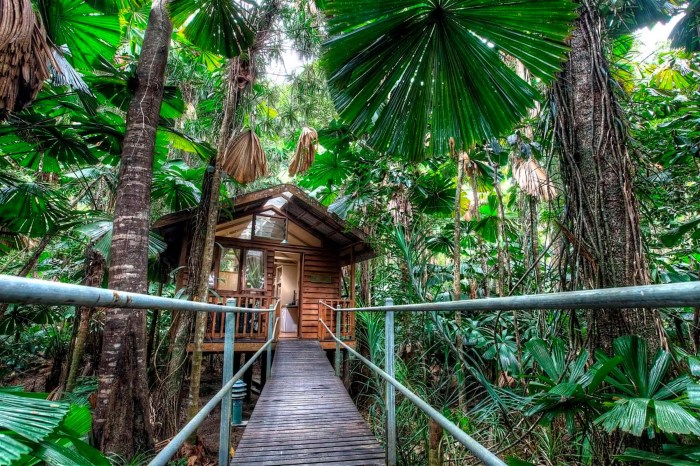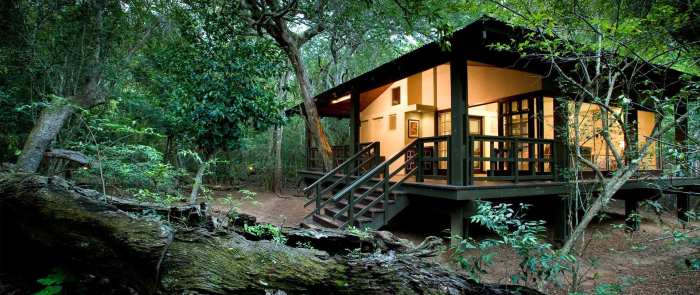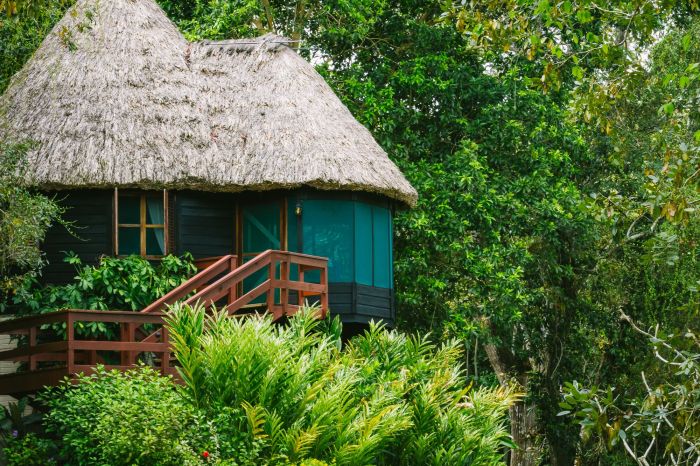Eco-lodges, havens of tranquility and environmental consciousness, offer a transformative travel experience where guests can immerse themselves in nature’s embrace while embracing sustainable practices. From the Amazon rainforest to the African savanna, these lodges are designed to minimize environmental impact and maximize guest enjoyment, creating an unforgettable journey for the eco-conscious traveler.
Their sustainable building practices, eco-friendly operations, and community involvement make eco-lodges a beacon of responsible tourism, promoting conservation efforts and cultural exchange. By choosing an eco-lodge, travelers can contribute to the preservation of fragile ecosystems and support local communities, all while enjoying an immersive and enriching travel experience.
Eco-Lodges: An Introduction

Eco-lodges are a type of accommodation that is designed to have a minimal impact on the environment. They are typically located in natural areas and use sustainable practices to reduce their carbon footprint. Eco-lodges often offer unique experiences that allow guests to connect with nature and learn about the local environment.
Eco-lodges can have a number of environmental benefits. They can help to protect endangered species and habitats, reduce pollution, and promote sustainable tourism. Eco-lodges can also help to raise awareness about environmental issues and inspire guests to adopt more sustainable practices in their own lives.
There are many different examples of eco-lodges around the world. Some popular examples include:
– The Treehouse Lodge in Costa Rica is built in the rainforest canopy and offers stunning views of the surrounding jungle.
– The Bambu Indah Eco Resort in Bali is made from sustainable materials and uses solar energy to power its operations.
– The Soneva Fushi Resort in the Maldives is located on a private island and offers guests a luxurious eco-friendly experience.
Design and Construction of Eco-Lodges
Eco-lodges prioritize sustainable building practices to minimize their environmental impact and promote responsible tourism. These practices include:
- Sustainable Materials: Eco-lodges use eco-friendly materials such as bamboo, reclaimed wood, and recycled steel to reduce deforestation and resource depletion.
- Energy Efficiency: Energy-efficient appliances, solar panels, and natural ventilation systems minimize energy consumption and reliance on fossil fuels.
- Waste Reduction: Composting systems, water-saving fixtures, and reusable amenities reduce waste generation and conserve resources.
Innovative Designs, Eco-lodges
Eco-lodges incorporate innovative designs to optimize energy efficiency and reduce waste:
- Passive Solar Design: Buildings are oriented to maximize sunlight for heating and lighting, reducing energy consumption.
- Green Roofs: Vegetated roofs insulate buildings, reduce runoff, and provide habitats for wildlife.
- Modular Construction: Prefabricated components allow for efficient construction, minimizing waste and site disturbance.
Eco-Friendly Operations and Management
Eco-lodges prioritize sustainable practices in their daily operations to minimize environmental impact and preserve the natural surroundings. This includes waste management, water conservation, and carbon footprint reduction.
Waste Management and Recycling
Eco-lodges implement comprehensive waste management systems to reduce waste generation and promote recycling. They:
– Establish waste sorting and composting programs to separate organic waste from recyclables and non-recyclables.
– Partner with local recycling facilities to ensure proper disposal and processing of recyclable materials, such as glass, paper, plastic, and metals.
– Use biodegradable and reusable materials whenever possible, reducing the need for single-use plastics and packaging.
– Educate guests and staff about waste reduction and recycling practices to foster responsible behavior.
Water Conservation Measures
Eco-lodges recognize the importance of water conservation in arid and water-scarce regions. They:
– Install low-flow appliances and fixtures, such as toilets, showers, and faucets, to reduce water consumption.
– Implement rainwater harvesting systems to collect and store rainwater for non-potable uses, such as irrigation and cleaning.
– Utilize drought-tolerant landscaping and native plants that require minimal watering.
– Educate guests about water conservation and encourage responsible water use.
Minimizing Carbon Footprint
Eco-lodges strive to minimize their carbon footprint by reducing energy consumption and utilizing renewable energy sources. They:
– Use energy-efficient lighting, appliances, and building materials to reduce electricity usage.
– Install solar panels or wind turbines to generate renewable energy on-site.
– Encourage guests to participate in energy-saving practices, such as turning off lights and appliances when not in use.
– Offset unavoidable carbon emissions through carbon credits or reforestation projects.
By implementing these eco-friendly practices, eco-lodges not only reduce their environmental impact but also contribute to the preservation of natural resources and the well-being of local communities.
Community Involvement and Social Impact
Eco-lodges prioritize responsible tourism practices that contribute to the well-being of local communities. They actively engage with residents, supporting their economic and social development.
Eco-lodges create employment opportunities for local residents, providing jobs in various sectors such as hospitality, guiding, and maintenance. These jobs offer income and career advancement opportunities, improving the economic well-being of families and communities.
Cultural Exchange and Educational Programs
Eco-lodges foster cultural exchange by offering authentic experiences that connect guests with local traditions and customs. They organize activities like guided tours, cultural performances, and workshops that showcase the unique heritage of the region.
Moreover, eco-lodges often collaborate with local schools and organizations to develop educational programs. These programs teach children about environmental conservation, sustainable practices, and the importance of preserving their cultural identity. By engaging with local communities, eco-lodges promote cross-cultural understanding and empower residents to protect their environment and culture.
Eco-Tourism and Sustainable Travel

Eco-lodges promote responsible tourism by providing accommodations and experiences that minimize environmental impact and support local communities. They offer opportunities for guests to connect with nature and learn about sustainable practices.
Activities and Experiences
Eco-lodges often offer activities that connect guests with nature, such as guided hikes, wildlife viewing, and birdwatching. These activities help guests appreciate the local ecosystem and learn about its conservation. Some eco-lodges also offer educational programs and workshops on sustainable living.
Tips for Travelers
When choosing an eco-friendly accommodation, travelers should consider the following tips:
- Look for eco-certifications, such as LEED or Green Globe.
- Choose accommodations that use renewable energy sources, such as solar or wind power.
- Select lodges that prioritize water conservation and waste reduction.
- Support accommodations that engage with local communities and support their cultural heritage.
By choosing eco-friendly accommodations, travelers can contribute to sustainable tourism and support local communities while enjoying a memorable and enriching travel experience.
Challenges and Opportunities for Eco-Lodges

Eco-lodges face unique challenges in balancing sustainability with profitability, while also navigating the ever-changing tourism landscape. Despite these challenges, eco-lodges have immense potential for growth and innovation, and emerging trends point towards a bright future for this sustainable tourism model.
Challenges
- Balancing Sustainability and Profitability: Eco-lodges must carefully manage their operations to minimize environmental impact while ensuring financial viability.
- Access to Remote Locations: Many eco-lodges are located in remote areas, which can make it difficult to access materials and supplies.
- Seasonality: Eco-lodges often experience seasonal fluctuations in demand, which can affect profitability.
- Competition from Traditional Lodging: Eco-lodges compete with traditional hotels and resorts for guests, who may not always prioritize sustainability.
- Lack of Infrastructure: Remote eco-lodges may lack access to reliable electricity, water, and transportation.
Opportunities
- Growing Demand for Sustainable Tourism: Travelers are increasingly seeking eco-friendly travel experiences, creating a growing market for eco-lodges.
- Government Support: Many governments offer incentives and support programs for eco-lodges.
- Technological Advancements: Innovations in renewable energy, water conservation, and waste management can help eco-lodges reduce their environmental impact.
- Partnerships with Local Communities: Eco-lodges can collaborate with local communities to create mutually beneficial relationships.
- Education and Awareness: Eco-lodges can play a role in educating guests about sustainability and environmental conservation.
Emerging Trends and Future Directions
- Off-Grid Operations: Eco-lodges are increasingly using renewable energy sources and innovative technologies to operate off-grid.
- Experiential Tourism: Eco-lodges are offering unique and immersive experiences that connect guests with nature and local culture.
- Community-Based Tourism: Eco-lodges are partnering with local communities to create sustainable tourism models that benefit both parties.
- Health and Wellness Retreats: Eco-lodges are offering wellness programs and retreats that focus on relaxation, rejuvenation, and holistic living.
- Adaptive Reuse of Historic Buildings: Eco-lodges are being created in historic buildings, preserving cultural heritage while promoting sustainability.
Final Wrap-Up

As the world becomes increasingly aware of the importance of sustainability, eco-lodges are poised to play a pivotal role in the future of tourism. Their commitment to environmental protection and social responsibility sets a benchmark for the industry, inspiring travelers to embrace a more conscious and fulfilling way to explore the world. By embracing eco-lodges, we can create a sustainable future for both travel and the planet we cherish.
Essential Questionnaire: Eco-lodges
What are the benefits of staying in an eco-lodge?
Eco-lodges offer a range of benefits, including reducing your environmental impact, supporting local communities, and enjoying unique and immersive nature experiences.
How can I find eco-friendly accommodations?
There are several websites and organizations that specialize in listing eco-lodges and other sustainable accommodations. You can also look for certifications such as LEED or Green Globe, which indicate that the property meets certain environmental standards.
What should I look for when choosing an eco-lodge?
When choosing an eco-lodge, consider factors such as the lodge’s environmental practices, its involvement in the local community, and the activities and experiences it offers. You can also read reviews from other travelers to get their perspectives on the lodge’s sustainability efforts.
Eco-lodges are sustainable accommodations that cater to nature enthusiasts. For adventure seekers looking to combine their passion for extreme sports with eco-friendly travel, consider exploring extreme sports vacations. These trips offer thrilling activities like rock climbing, kayaking, and zip-lining while promoting responsible tourism.
Afterward, relax and rejuvenate in eco-lodges that prioritize environmental conservation, offering a unique blend of adventure and sustainability.
Eco-lodges are a great way to experience nature and adventure while minimizing your environmental impact. If you’re a scuba diving enthusiast, you’ll be pleased to know that many eco-lodges are located near scuba diving locations. This means you can enjoy your favorite underwater activity while also supporting sustainable tourism practices.
Many eco-lodges offer diving packages that include accommodation, meals, and diving excursions. So, if you’re looking for a way to combine your love of diving with your commitment to the environment, consider booking a stay at an eco-lodge.
Eco-lodges are a great option for families on a budget. They offer a unique and immersive experience in nature, and they’re often much more affordable than traditional hotels. Budget family vacations can be a great way to save money and still have a memorable experience.
Eco-lodges typically offer a variety of activities for families, such as hiking, swimming, and wildlife viewing.